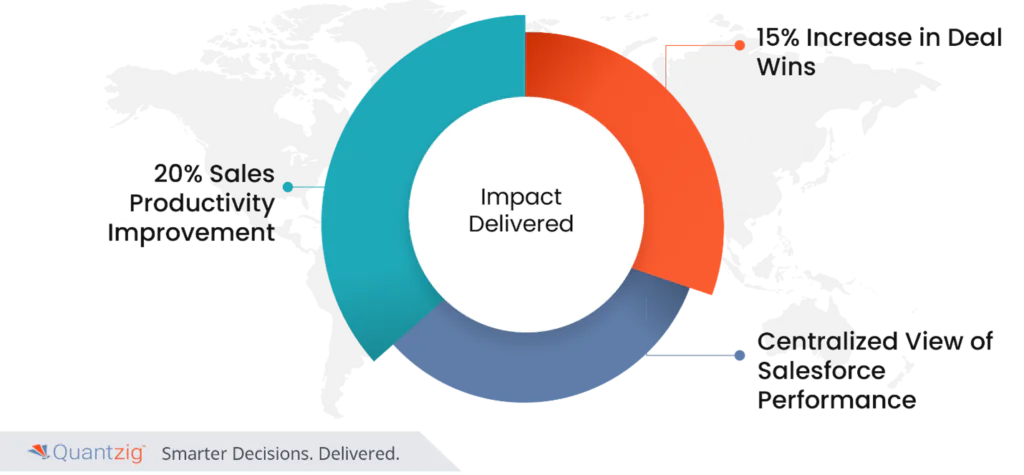
Table of Contents
Summary
- Client:
The client was a multinational chemical manufacturer with more than $1 Billion in revenues and 10+ manufacturing facilities.
- Challenge:
Salesforce data was siloed, inconsistent, and difficult to retrieve, making it challenging to analyze and draw insights. Decision-making was delayed, the workload for analysts increased, and missed opportunities arose due to the lack of a centralized platform for data analysis.
- Solution:
Quantzig created a single data lake under a sales performance optimization plan to provide a comprehensive view of salesforce performance, identified key influencing factors, and developed targeted sales strategies based on historical data analysis. An objective KED framework was built to track salesforce performance and develop more accurate sales forecasts. Advanced regression techniques were used to build a win/loss predictor to calculate the probability of a win based on various levers.
Impact Delivered:
- 20% Sales Productivity Improvement
- 15% increase in deal wins
- Centralized view of salesforce performance
Industry Overview
- The multinational chemical industry is a vast and complex sector that encompasses a wide range of products and applications. It is one of the largest industrial sectors in the world, with annual revenues exceeding $5 trillion.
- The global chemical industry has been experiencing significant growth in recent years, with an estimated value of around $4.4 trillion in 2020. The growth of this industry can be attributed to a range of factors, including population growth, urbanization, and increasing demands for consumer goods.
- Multinational chemical manufacturers make major contributions to our global economy as they have a market share of around 30% in the global chemical industry.
- The industry faces challenges such as regulatory pressures, increasing competition, and the need to adapt to changing customer preferences. This industry is also facing increasing scrutiny over its environmental impact, particularly in relation to plastic waste, and carbon emissions.
- The development of new technologies and materials, such as bioplastics and renewable feedstocks, is providing new opportunities for innovation and growth. Data analytics can provide valuable insights to multinational chemical manufacturing companies, helping them optimize their sales force, increase sales, and improve customer satisfaction.
About the Client
- Our recent client was a multinational chemical manufacturer with more than $1 Billion in revenues and 10+ manufacturing facilities. They produce a wide range of chemical products, including industrial chemicals, consumer chemicals, specialty chemicals, energy and fuel additives, and performance materials.
- Despite having a strong sales force, the client was not able to see a corresponding impact on revenue increase. They lacked a centralized platform or system to optimize and monitor their salesforce performance. The lack of visibility into sales force performance made it difficult for the client to identify and address issues that were impacting their revenue growth.
Challenges Faced
- Data pertaining to sales force performance (goals, call tracking by sales reps, sales changes, etc.) were all siloed and spread across multiple databases. As data was stored in different formats or different systems, several inconsistencies and errors made it difficult to analyze and draw meaningful insights. Besides, retrieving and consolidating the data was also time-consuming and resource-intensive, making it difficult to make timely decisions. To overcome this challenge, the client needed a centralized platform or system that can integrate data from multiple sources, provide real-time visibility into sales force performance, and enable advanced analytics to drive decision-making.
- The leadership team had to wait for weeks together to get answers to any performance issues as each question was answered through ad-hoc analysis. It led to delayed decision-making, limited ability to respond to market changes, missed opportunities, and increased workload for analysts. The delayed decision-making caused by the lengthy process of obtaining answers to performance issues had a negative impact on organizational productivity and efficiency. The limited ability to respond to market changes meant that the company was unable to capitalize on new opportunities and was at risk of falling behind competitors. The increased workload for analysts also had a knock-on effect on their productivity and job satisfaction, as they were unable to focus on strategic projects due to the constant demand for ad-hoc analysis.
- The leadership team had no platform that could help to deep dive into the root causes of the poor performance and provide corresponding guidance. Without a standardized platform for data analysis and decision-making, different members of the leadership team made decisions based on different interpretations of the data which led to inconsistent decision-making and suboptimal outcomes.
Solutions
- Quantzig aggregated information across various internal, external, and CRM-based sources into a single data lake. It helped the leadership team to get a comprehensive view of the salesforce performance, enabling them to identify patterns, trends, and outliers that may not be apparent when analyzing data in isolation in a bid to enhance sales performance optimization.
- We further identified the key influencing factors for deal conversion such as deal size, incumbent vendor, business segment, opportunity type, product, period, seasonality, etc. By analyzing the key influencing factors, the client gained a deeper understanding of what factors are driving customer decisions and tailored their sales performance optimization accordingly. They developed targeted sales strategies that are most likely to resonate with customers, improving the chances of converting sales. Quantzig team analyzed historical data on key influencing factors, that guided our client to develop more accurate forecasts of future sales performance, helping them to better plan and allocate resources.
- We built an objective KED framework and built a mechanism to track the salesforce performance against the KEDs.By tracking salesforce performance against KEDs, the client identified those areas where performance is lagging and took initiatives to address those issues, leading to continuous improvement over time. By continuously tracking performance against these metrics, the client identified trends and patterns in their salesforce’s behavior and made proactive adjustments to optimize their performance.
- Further, through advanced regression techniques, we built a win/loss predictor to calculate the probability of a win based on various levers. The client was able to make data-driven decisions about which opportunities to pursue, which deals to prioritize, and how to allocate resources effectively. This ultimately improved sales team efficiency and effectiveness, leading to increased sales revenues and better salesforce performance.


